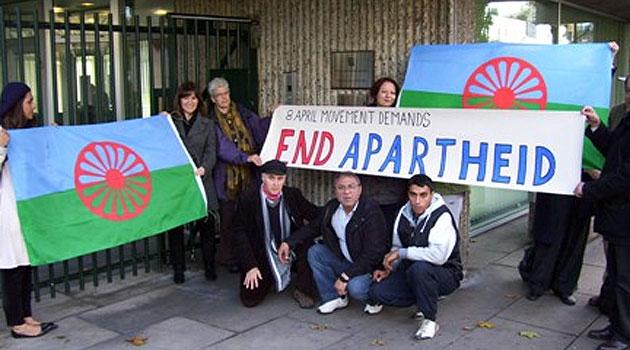Showing solidarity with events in Ostrava, Prague and elsewhere, Roma and
supporters from several countries protested outside the Czech Embassy in London
on 13 November against the failure of authorities there to end
apartheid in schools despite a ruling by the European Court of Human Rights.
Czech veteran civil rights activist Ladislav Baláž, chair of Euro-Roma,
handed in a letter to Ambassador Michael Žantovský reminding him it’s now five
years since the court issued a judgement stating that by consigning Romani
children to schools for pupils with learning disabilities they were denying them
the right to quality education.
Written by consultant Lucie Fremlová, the letter points out that her study
From Segregation to Inclusion has revealed that 85 % of Roma pupils interviewed at UK
schools had suffered de facto segregation in the Czech and Slovak education
systems. A large proportion also complained of racism.
Fremlová presented her findings at a Czech Interior Ministry conference on 4
October. She is to make a further presentation at a Council of Europe seminar
later this month.
“We just want the Czech Republic to obey this ruling” said Ladislav Baláž. “It has
been a long struggle and it’s not over yet.”
Toma Nikolaev, a Romani journalist who is facing extradition from the UK, said
he joined the protest because a similar situation existed in Bulgaria. He hoped
the judgement would have an impact on the situation there.
More than 150 Roma, including parents and some of the original pupils
included in the court case, held a protest march through Ostrava on 7 November.
Further events, including an exhibition sponsored by the OSI, are being held in
Prague and elsewhere.
The exhibition, which opened on 13 November, is entitled "Failing Another
Generation". It features the stories of those who challenged the system back in
1999. The landmark judgement which they achieved called on the Czech government
to end segregation.
Yet today, Roma continue to encounter discrimination and most still find
themselves consigned to so-called special classes, segregated from others. A
study by the Czech ombudsman shows that while Roma comprise less than 3 % of the
population, some 32% of pupils in what are now called "practical primary schools"
are Romani.
Grotesquely highlighting the problems Roma encounter in Czech schools, new
anti-Roma graffiti appeared this month on the walls of the Jungmannova primary
school in Jihlava. They read "For the white race" and "Gypsies to the gas
chambers". A school building was also vandalized. No arrests have been made but
it has been stated that culprits could face five years in prison for advocating
support for the suppression of human rights.
In the likely circumstance that desegregation is not quickly completed in the
Czech Republic, Slovakia and Bulgaria, the 8 April Movement has pledged to hold
a bigger demonstration in London to mark Roma Nation Day 2013. The movement is calling on
Romani organizations across the globe to carry out coordinated events on 8 April
in protest against unchecked anti-Roma racism and violence, which includes
forced deportations and evictions.
“I will be contacting activists in Romania to link up with us,” said Lavinia
Olmazu, a member of the Roma Academic Network, “We cannot tolerate this
discrimination and the law is now on our side.”
